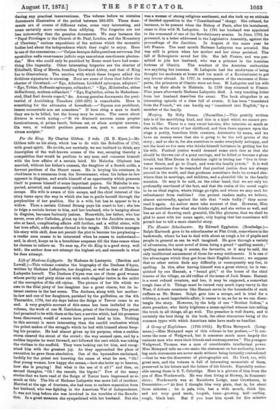Madory. By Milly Deane. (Macmillan.)—This prettily written tale is of
the mortifying kind, and this is a kind which we cannot pro- fess to like. There is a very sweet heroine, who interests us much as she tells us the story of her childhood, and then there appears upon the stage a pretty, heartless little creature, Antoinette by name, and we have an uneasy sense that she is going to be the evil genius of the story ; and so she is, for she contrives to make everybody unhappy, and not the least so the man who thinks himself fortunate in getting her for his wife. Poetical justice would demand some such fate as that she should be thrown out of a pony carriage, and be killed or become a pious invalid, but Miss Deane is doubtless right in letting her "live in Gros- venor Street, and go to Court, and wear the family jewels." It is well for us sometimes to be reminded that poetical justice does not always prevail in the world, and that goodness sometimes finds its reward else- where than in marriage, and children, and a plentiful life in the family mansion. Or may it be said, on the other hand, that we are only too profoundly convinced of the fact, and that the realm of the novel ought to be an ideal region, where things go right, and where we may seek for refreshment from realities ? One protest readers make, we believe, almost universally, against the tale that "ends badly ;" they never read it again. An author must take account of that. However, Miss Doane doubtless does what she thinks right, and she writes so well, and has an art of drawing such graceful, life-like pictures, that we shall be glad to meet with her name again, only hoping that her conscience will permit her to toll a more cheerful story.


































 Previous page
Previous page